Levothyroxine Sodium 25 mg Tablets for Dogs: Effective Treatment for Hypothyroidism
Levothyroxine Sodium 25 mg tablets are commonly prescribed to manage hypothyroidism in dogs, a condition where the thyroid gland fails to produce enough thyroid hormones. This blog aims to provide a comprehensive understanding of Levothyroxine Sodium tablets, their indications, dosage recommendations, possible side effects, and essential guidelines for administering the medication safely. Hypothyroidism in dogs can lead to a variety of symptoms, including lethargy, weight gain, and hair loss.
What is Hypothyroidism in Dogs?
It occurs when the thyroid gland, located in the neck, produces insufficient amounts of thyroid hormones—primarily thyroxine (T4)—which are vital for regulating metabolism, energy, and overall cellular functions.
Causes of Hypothyroidism in Dogs
- Autoimmune Disease (Lymphocytic Thyroiditis): The most common cause of hypothyroidism in dogs is an autoimmune disease where the immune system mistakenly attacks the thyroid gland, reducing its ability to produce hormones.
- Thyroid Gland Atrophy: As dogs age, the thyroid tissue may atrophy (shrink), leading to reduced hormone production.
Symptoms of Hypothyroidism
Common symptoms include:
- Weight gain despite normal or reduced appetite.
- Lethargy and lack of energy.
- Hair loss, often around the tail and legs.
- Dry, flaky skin.
- Cold intolerance (dogs may seek warmth).
- Slow heart rate (bradycardia).
- Depression or behavioral changes.
Indications for Levothyroxine Sodium 25 mg Tablets for Dogs
Levothyroxine Sodium 25 mg tablets are primarily prescribed to treat hypothyroidism in dogs, where the thyroid gland doesn’t produce enough hormones. This medication helps restore thyroid hormone levels, improving metabolism, energy production, and overall health.
Key Indications:
- Treatment of Hypothyroidism: Levothyroxine replaces deficient thyroid hormones, alleviating symptoms like weight gain, lethargy, hair loss, and cold intolerance.
- Thyroid Hormone Replacement: Used for lifelong treatment of dogs with primary hypothyroidism, restoring normal metabolic functions.
- Management of Secondary Hypothyroidism: Helps compensate for insufficient thyroid hormone due to pituitary dysfunction.
- Support for Non-Thyroidal Illness Syndrome (NTIS): Normalizes thyroid hormone levels in dogs affected by acute or chronic illness.
- Adjuvant Treatment in Hypothyroid-Associated Disorders: Improves cardiovascular health, muscle tone, and coat condition affected by hypothyroidism.
- Improving Quality of Life in Geriatric Dogs: Boosts energy, mobility, and vitality in older dogs suffering from thyroid deficiencies.
Benefits of Levothyroxine Sodium 25 mg Tablets for Dogs
- Restores Normal Thyroid Function: Replaces deficient thyroid hormones, regulating metabolism, energy production, and overall bodily functions.
- Alleviates Hypothyroidism Symptoms: Improves common symptoms such as lethargy, weight gain, muscle weakness, hair loss, and cold intolerance, helping dogs feel more active and comfortable.
- Lifelong Management: Offers a reliable, lifelong thyroid hormone replacement therapy, essential for dogs with primary hypothyroidism, ensuring consistent thyroid function.
- Supports Metabolic Health: Regulates vital metabolic processes, including protein synthesis, energy balance, and fat breakdown, leading to better overall health.
- Improves Musculoskeletal Health: Enhances muscle strength and tone, alleviating stiffness and promoting better mobility, especially in older dogs.
- Promotes Healthier Skin and Coat: Reduces dry, flaky skin, and promotes a shinier, healthier coat, addressing the coat and skin issues associated with hypothyroidism.
- Cardiovascular Support: Levothyroxine helps improve heart rate and function, reducing the risk of cardiovascular problems often linked to hypothyroidism.
- Boosts Energy in Geriatric Dogs: Enhances the energy, mobility, and overall quality of life in older dogs, helping them remain active and engaged despite aging.
Levothyroxine Sodium 25 mg Tablets for Dogs: Dosage and Usage Guidelines
Levothyroxine Sodium 25 mg tablets are typically administered to dogs with hypothyroidism to replace the deficient thyroid hormone. The dosage is determined based on the dog’s weight and individual needs, and it is critical to follow your veterinarian’s recommendations to ensure the correct dosage and effectiveness of the treatment.
Initial Dosage:
This is generally given as a single daily dose, although your vet may recommend splitting the dose for certain cases.
Example Dosing Based on Weight:
| Body Weight (kg) | Starting Dose (mg/day) | Levothyroxine Sodium Tablets (25 mg) | Frequency |
| 2 – 5 kg | 0.1 – 0.2 mg | 0.25 – 0.5 tablet(s) | Once daily |
| 5 – 10 kg | 0.25 – 0.5 mg | 0.5 – 1 tablet(s) | Once daily |
| 10 – 20 kg | 0.5 – 1 mg | 1 – 2 tablet(s) | Once daily |
| 20 – 30 kg | 1 – 1.5 mg | 2 – 3 tablet(s) | Once daily |
| 30+ kg | 1.5 – 2 mg | 3 – 4 tablet(s) | Once daily |
Dosage Adjustments:
- Initial Dose: It is recommended to start at the lower end of the dosage range and gradually increase as needed based on blood test results.
- Follow-Up Testing: Periodic blood tests (serum T4 and TSH) are crucial to monitor thyroid hormone levels.
Administration Instructions:
- Oral Administration: Levothyroxine Sodium is given orally. It is best to administer the tablet on an empty stomach for optimal absorption, but if your dog has a sensitive stomach, it can be given with food.
- Crushing or Splitting: If your dog has difficulty swallowing the tablet, you can crush it or split it and mix it with a small amount of food. Always ensure the entire dose is consumed.
Important Considerations:
- Monitor for Side Effects: Look out for signs of overdosage, such as excessive thirst, urination, rapid heart rate, or hyperactivity. Report any unusual symptoms to your veterinarian promptly.
- Veterinary Supervision: Since Levothyroxine therapy is lifelong for most dogs with hypothyroidism, regular check-ups and dosage adjustments are essential.
- Diet and Lifestyle: Maintaining a balanced diet and regular exercise can support the effectiveness of the treatment and help manage your dog’s weight.
Monitoring and Follow-up Care
Once your dog starts taking Levothyroxine Sodium, it is essential to monitor their response to the medication. Regular follow-up visits to the veterinarian are necessary to adjust the dosage based on thyroid hormone levels.
Blood Tests
Your vet will recommend periodic blood tests to measure:
- T4 levels: To check if the thyroid hormone levels are within the optimal range.
- TSH levels: Thyroid-stimulating hormone (TSH) is often measured to assess the pituitary gland’s response to thyroid hormone levels.
Signs to Watch For
During treatment, keep an eye out for signs of over- or under-treatment, including:
- Increased thirst and urination (indicating potential overdose).
- Excessive weight loss or hyperactivity (suggesting too much thyroid hormone).
Possible Adverse Reactions of Levothyroxine Sodium 25 mg Tablets
Levothyroxine Sodium is generally well tolerated by most dogs, but like all medications, it can have side effects, especially if the dosage is not properly managed.
Common Side Effects
- Increased thirst and urination (polydipsia and polyuria)
- Hyperactivity or restlessness
- Vomiting or diarrhea
- Weight loss or muscle wasting
- Changes in coat quality, such as hair loss or dry skin
- Rapid heart rate (tachycardia)
Serious Side Effects
Although rare, serious side effects may occur:
- Severe tachycardia (excessively high heart rate)
- Muscle tremors or shaking
- Seizures or neurological issues (in cases of overdose)
- Severe weight loss and signs of hyperthyroidism
Overdose and Its Consequences
An overdose of Levothyroxine Sodium can cause symptoms of hyperthyroidism, which is the opposite condition to hypothyroidism. When thyroid hormones are too high, the body goes into overdrive, leading to the following symptoms:
- Increased heart rate
- Restlessness or agitation
- Vomiting and diarrhea
- Excessive thirst and urination
If you suspect that your dog has ingested too much Levothyroxine, seek veterinary care immediately.
Contraindications and Precautions
While Levothyroxine Sodium is effective for most dogs with hypothyroidism, there are some precautions to be aware of:
- Heart Disease: Dogs with pre-existing heart conditions should be monitored carefully while taking Levothyroxine.
- Pregnancy: Levothyroxine is generally safe during pregnancy, but it’s essential to consult with a veterinarian for proper dosing.
- Drug Interactions: Always inform your veterinarian about other medications your dog is taking, as Levothyroxine may interact with certain drugs like corticosteroids and some heart medications.
Clinical Studies on Levothyroxine Sodium 25 mg Tablets for Canines
Levothyroxine Sodium 25 mg tablets are the primary treatment for hypothyroidism in dogs. Below is a summary of key clinical findings regarding its efficacy, safety, and dosage:
1. Efficacy in Treating Hypothyroidism
- Study 1: A clinical trial of 50 dogs showed significant improvements in activity levels and weight loss after 4–6 weeks of Levothyroxine treatment, with blood tests confirming normalized T4 levels.
- Study 2: In a placebo-controlled trial, dogs receiving Levothyroxine had improved muscle tone and coat quality, validating its efficacy in treating hypothyroid symptoms.
2. Dosage and Administration
- Study 3: Some dogs required adjusted doses based on factors like weight and age, highlighting the importance of regular T4 monitoring to prevent overdosing or underdosing.
- Study 4: Once-daily dosing was as effective as divided doses, providing greater convenience for pet owners.
3. Safety and Side Effects
- Study 5: Over 6 months, mild side effects like increased thirst and hyperactivity were observed, but these were generally dose-related and resolved with proper adjustment.
- Study 6: Overdose can lead to hyperthyroidism symptoms such as increased heart rate and restlessness, requiring careful monitoring, especially for small or older dogs.
4. Long-Term Management
- Study 7: A 2-year study demonstrated that with regular blood work and proper dosage adjustments, dogs on Levothyroxine therapy led healthy, thyroid-controlled lives without major issues.
5. Secondary Hypothyroidism and NTIS
- Study 8: Levothyroxine was also effective for dogs with Non-Thyroidal Illness Syndrome (NTIS), helping to normalize thyroid levels and improve symptoms like lethargy and poor coat condition.
Conclusion
Levothyroxine Sodium 25 mg tablets play a crucial role in managing hypothyroidism in dogs, a condition that can significantly impact their health and quality of life. By restoring thyroid hormone levels, Levothyroxine helps regulate metabolism, energy production, and overall well-being. It is a trusted treatment that, when administered correctly, can dramatically improve your dog’s condition and bring them back to their normal, vibrant self. However, like all medications, Levothyroxine requires careful management. Proper dosing, regular blood tests, and consistent veterinary follow-ups are key to ensuring your dog’s thyroid hormone levels stay balanced. It’s important to be aware of potential side effects, both common and severe, and to monitor your dog closely for any changes in behavior or health.







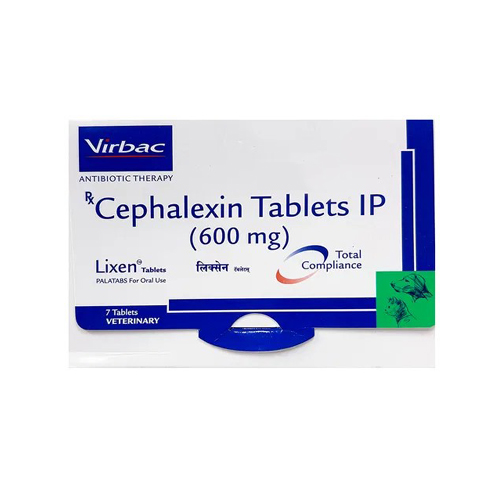
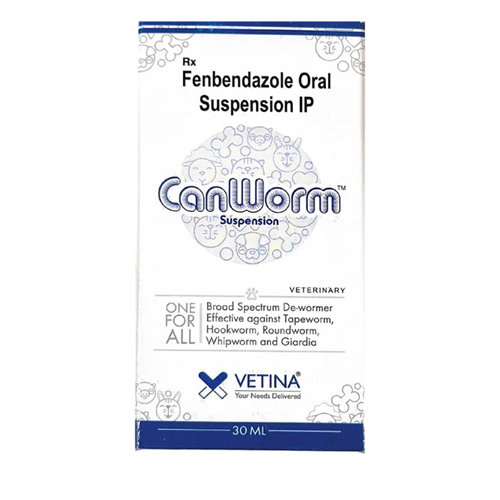


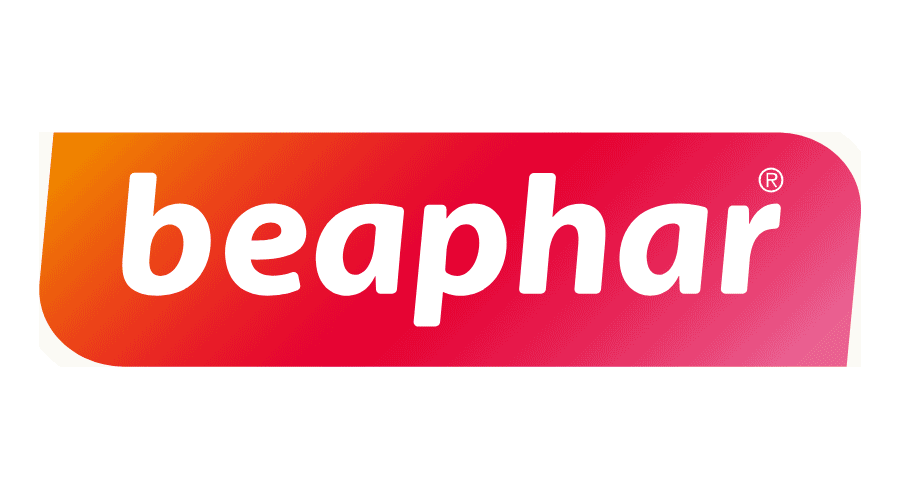

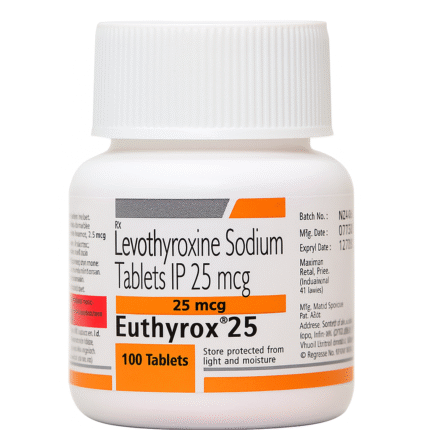
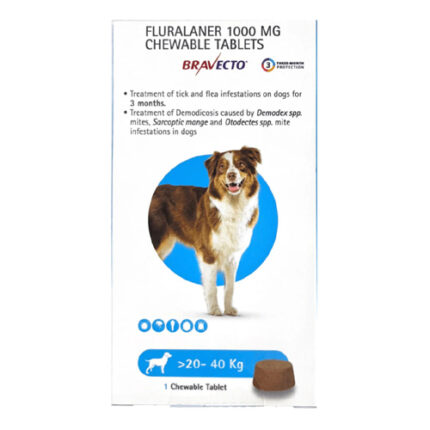
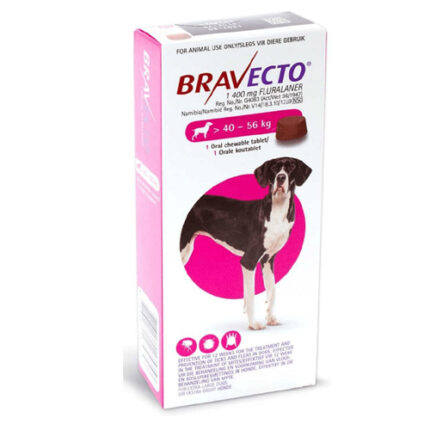
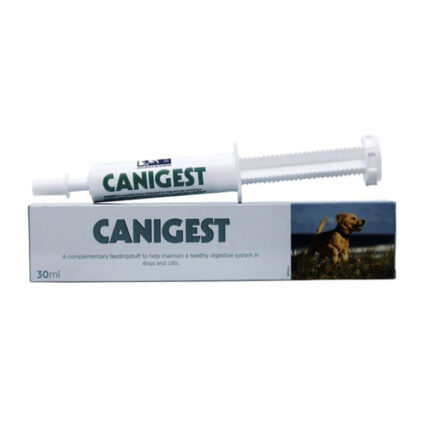
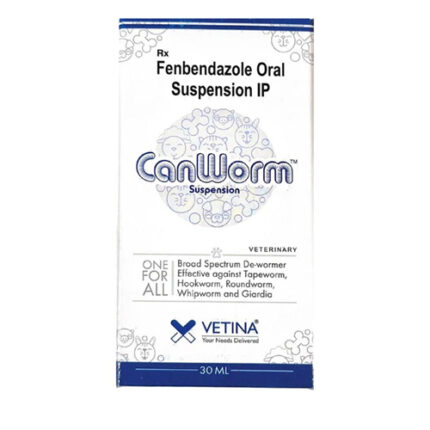
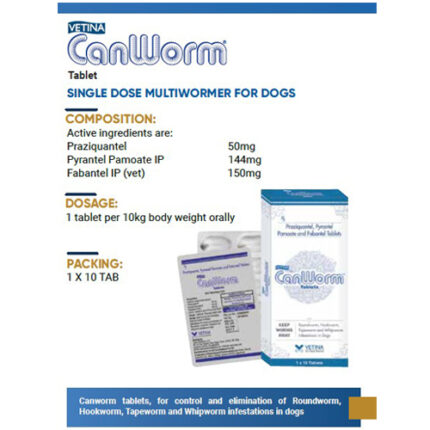
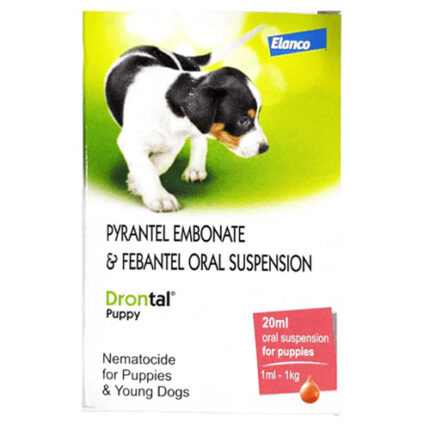
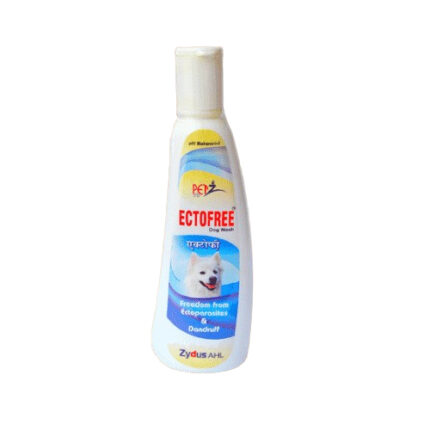
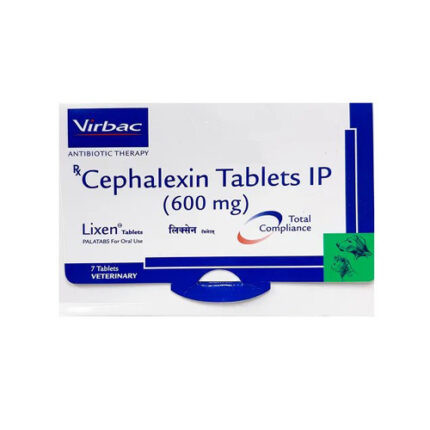
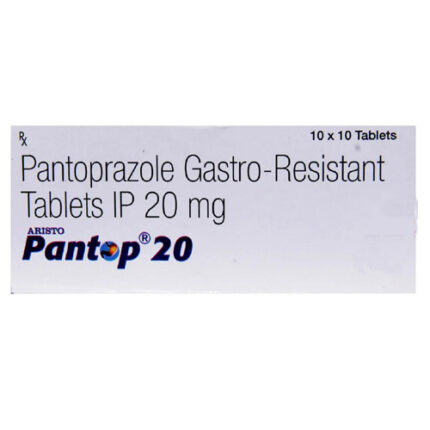
Reviews
There are no reviews yet.